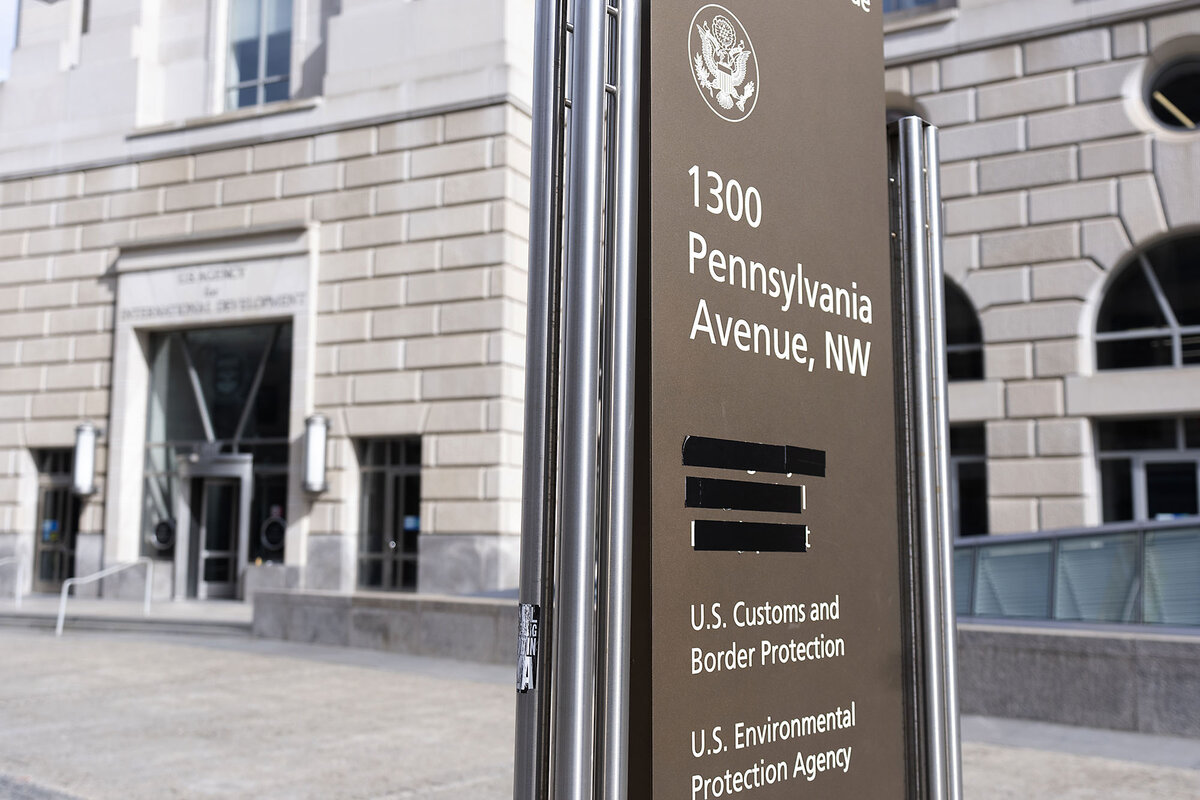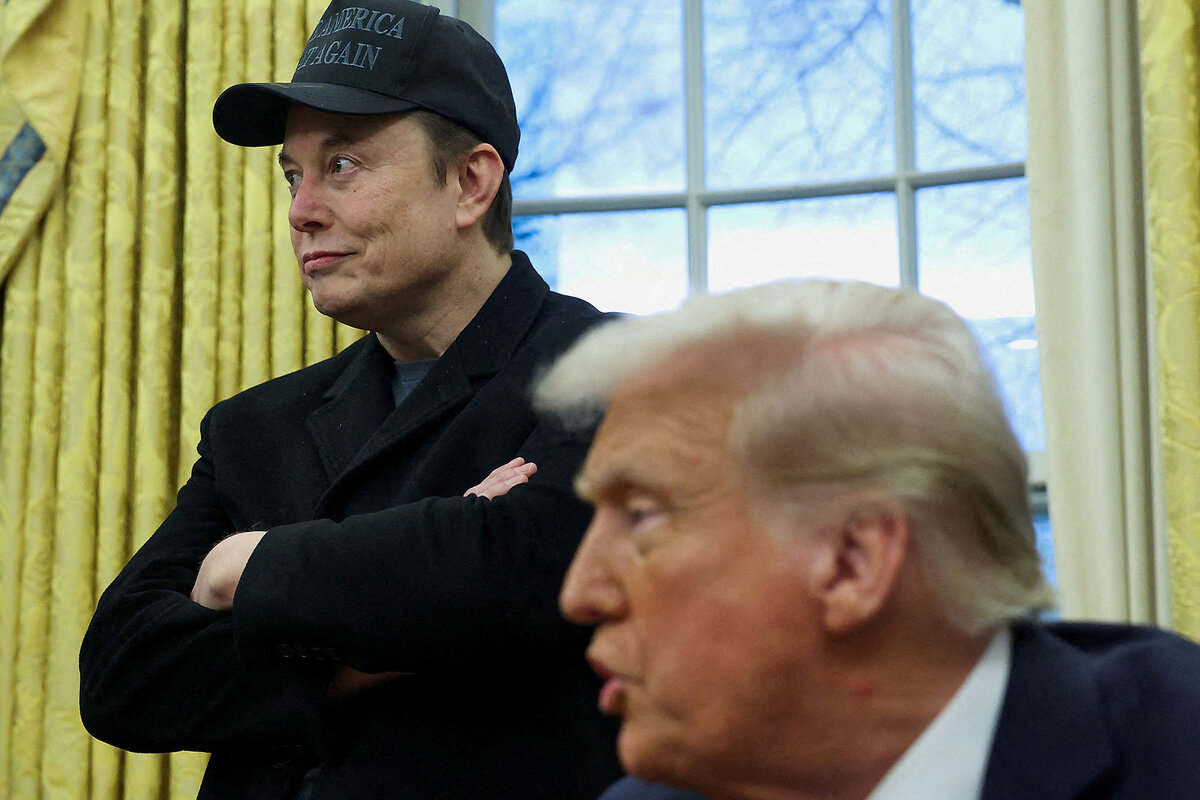From the wreckage of USAID, can anything be saved?
Loading...
| London
It may well be the most profound change that President Donald Trump has yet wreaked on America’s place in the world. And if global attention has already moved elsewhere, barely a week later, it is only because of the sheer pace of his campaign to reshape the United States government.
The significance of the move, however, will likely be anything but transitory.
For its victim – the U.S. Agency for International Development – is the world’s main funding source for programs to alleviate famine, disease, and the effects of war, and to promote public health, education, conflict resolution, and economic development.
Why We Wrote This
President Trump has allowed Elon Musk to oversee the destruction of the U.S. Agency for International Development, America’s foreign aid arm and one of the most broadly impactful agencies in Washington. Will a 90-day freeze on its activities satisfy the new administration?
USAID, created early in John F. Kennedy’s presidency in 1961, embodied his vision of U.S. engagement overseas: that, ideally, America should use its wealth and power to promote development and democracy internationally, and that this was in Washington’s own political, economic, and security interests as well.
It is that vision, not just USAID itself, which Mr. Trump seems to have in his sights.
His initial targets are narrower: alleged corruption and incompetence, and specific programs in fields such as LGBTQ+ rights and birth control. His “enforcement czar,” Elon Musk, sees them as serving a political agenda of “the radical-left globalists.”
Their response: to shut down USAID altogether, bringing foreign aid under the control of the State Department and, they say, aligning it with American “interests and values.”
The move to dismantle USAID – “feeding it into the woodchipper,” in Mr. Musk’s phrase – began with an executive order by Mr. Trump to freeze all foreign aid for 90 days. All but a few of its 10,000 people worldwide were ordered home.
Amid social media posts lambasting the agency, Mr. Musk sent in his team. Among their first acts? To tear down the memorial panel at USAID headquarters, honoring staff members who died in the line of duty.
There were a few hitches, beginning with court challenges to the summary closure of an agency set up and funded by Congress. A federal judge paused the announced decision to place more than 2,000 staff on administrative leave.
There were also effects that Mr. Trump’s team seems not to have anticipated: the sudden interruption of programs ranging from war-zone relief and emergency food aid, to basic health provisions and pandemic prevention.
Secretary of State Marco Rubio promptly declared that programs “providing food or medicine or anything that is saving lives and is immediate and urgent” would be exempted. But since most overseas staff had been told their jobs were being eliminated, and confusion reigned over how funding would continue, a wide range of programs were interrupted or halted.
Mr. Musk, himself, told reporters this week that he had acted to “turn on funding” for USAID’s HIV/AIDS and Ebola programs in Africa.
So they, at least, would seem safe.
Yet the fate of thousands of other USAID programs remains unclear, and the signs so far are that Mr. Trump’s “America First” political agenda will determine their future.
Out, almost certainly, will be “woke” causes like diversity, minority rights, and climate-change mitigation. So, too, programs supporting democracy or human rights – especially in countries run by Trump-friendly autocrats such as Hungary.
There will also, no doubt, be a search for efficiency savings, and efforts to root out what Mr. Trump has called incompetence and corruption.
But few such allegations thus far to fact-checkers’ scrutiny.
Nor has the suggestion that USAID has proven a colossal waste of American taxpayers’ money. Its $44 billion budget represents a tiny sliver of the roughly $6.1 trillion federal budget.
And while there is almost certainly room for greater efficiency in an organization of USAID’s size and complexity, it does seem to have been delivering a remarkable bang for its bucks.
It distributes over 40% of the world’s humanitarian aid.
It has played an especially important role in responding to natural disasters and caring for the victims of war. Its emergency food aid, a major part of its operations, has provided a lifeline in potential famine areas.
It has also helped provide clean water and sanitation in developing countries, and runs literacy, education, and employment programs there, especially for young women.
How much of this will fit the Trump administration’s definition of “American interests and values” will determine the future shape of foreign assistance.
But the decision to shut down USAID underscores how far the administration’s view of those interests and values has shifted from President Kennedy’s vision when he created the agency.
“Man holds in his mortal hands the power to abolish all forms of human poverty and all forms of human life,” he said in his .
Turning to the plight of “those people in the huts and villages of half the globe struggling to break the bonds of mass misery,” he declared: “We pledge our best efforts to help them help themselves.”
And that was not, he said, “because the Communists may be doing it, not because we seek their votes, but because it is right.
“If a free society cannot help the many who are poor, it cannot save the few who are rich.”







